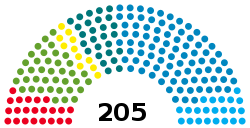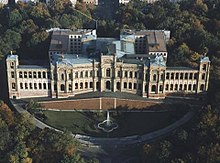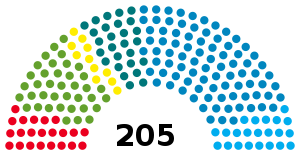Landtag of Bavaria
Landtag of Bavaria Bayerischer Landtag | |
|---|---|
 | |
| Type | |
| Type | Landtag |
| Leadership | |
President of the Landtag | Ilse Aigner, CSU since 5 November 2018 |
| Structure | |
| Seats | 205 |
 | |
Political groups | Government (112)[1]
Opposition (93)
|
| Elections | |
Last election | 14 October 2018 |
Next election | 2023 |
| Meeting place | |
 | |
Maximilianeum, Munich | |
| Website | |
| www.bayern.landtag.de/ | |

Presentation medal of the Bavarian Parliament (Bayerische Ständeversammlung) 1819 to their King Maximilian I Joseph, on the first anniversary of the constitution of 1818, obverse.

Bavaria Thaler 1834, Diet of the Kingdom (Landtag), uniface Pb-Strike.

Landtag of Bavaria
The Landtag of Bavaria (State Diet of Bavaria) is the unicameral legislature of the state of Bavaria in Germany. The parliament meets in the Maximilianeum in Munich.
Elections to the Landtag are held every five years[2] and have to be conducted on a Sunday or public holiday.[3] The following elections have to be held no earlier than 59 months and no later than 62 months after the previous one,[4] unless the Landtag is dissolved.
The most recent elections to the Bavarian Landtag were held on 14 October 2018.
Contents
1 History
2 Results of the 2018 election
3 Composition of the Landtag
4 Election results 1946–2018
5 See also
6 References
7 External links
History
The Landtag of Bavaria was founded in 1818, in the Kingdom of Bavaria. Originally it was called the Ständeversammlung and was divided into an upper house, the Kammer der Reichsräte (chamber of imperial counsellors), and a lower house, the Kammer der Abgeordneten. In 1834 the Ständeversammlung was renamed the Landtag (state diet).
In the Weimar Republic, from 1919 on, under the Bamberg Constitution, the upper house of the Landtag was abolished and its lower house became a unicameral democratic elected assembly. In 1933, in Nazi Germany, the Landtag suffered Gleichschaltung like all German state parliaments. It was dissolved on 30 January 1934.
After the Second World War, the new Constitution of Bavaria was enacted and the first new Landtag elections took place on 1 December 1946. Between 1946 and 1999 there was again an upper house, the Senate of Bavaria.
Results of the 2018 election
 | ||||||||
| Party | Ideology | Votes | Votes % (change) | Seats (change) | Seats % | |||
|---|---|---|---|---|---|---|---|---|
Christian Social Union (CSU) | Christian democracy | 5,047,006 | 37.2% | −10.4pp | 85 | −16 | 41.5% | |
Alliance '90/The Greens (Grünen) | Green politics | 2,377,766 | 17.6% | +9.0pp | 38 | +20 | 18.5% | |
Free Voters (FW) | Regionalism | 1,571,288 | 11.6% | +2.6pp | 27 | +8 | 13.2% | |
Alternative for Germany (AfD) | German nationalism | 1,383,866 | 10.2% | +10.2pp | 22 | +22 | 10.7% | |
Social Democratic Party (SPD) | Social democracy | 1,317,942 | 9.7% | −10.9pp | 22 | −20 | 10.7% | |
Free Democratic Party (FDP) | Liberalism | 687,842 | 5.1% | +1.8pp | 11 | +11 | 5.4% | |
The Left (Die Linke) | Democratic socialism | 435,949 | 3.2% | +1.1pp | 0 | ±0 | 0% | |
Bavaria Party (BP) | Bavarian nationalism | 231,930 | 1.7% | −0.4pp | 0 | ±0 | 0% | |
Ecological Democratic Party (ÖDP) | Green conservatism | 211,784 | 1.6% | −0.5pp | 0 | ±0 | 0% | |
Pirate Party (Piraten) | Pirate politics | 60,087 | 0.4% | −1.5pp | 0 | ±0 | 0% | |
| Party for Franconia (Die Franken) | Regionalism | 31,547 | 0.2% | −0.5pp | 0 | ±0 | 0% | |
| Others | 0 | ±0 | 0% | |||||
| Total | 11,812,965 | 100.0% | 205 | +25 | ||||
Composition of the Landtag
Bavaria |
|---|
 |
This article is part of a series on the politics and government of Bavaria |
Constitution
|
Executive
|
Legislature
|
Divisions
|
Elections
|
Foreign policy
|
|
The Bavarian Landtag is elected through personalized proportional representation with 90 Constituencies, but unlike the Bundestag, the seven Administrative Districts are serving as "Electoral Regions" with a fixed number of seats allocated, flexible regional lists are used and both votes count equally regarding the proportional results so that even the "lost" Constituency votes count. Also, Constituency candidates are usually also List candidates of their Party and thus able to gain enough votes to have a chance of entering the Landtag through their list even though they could not win their Constituency.
The state government is formed by the CSU. Markus Söder has been Minister-President of Bavaria since March 2018, when he succeeded Horst Seehofer. The CSU has dominated the Bavarian Landtag for nearly the entire post-war period.
The CSU's 2003 election victory was the first time in the history of the Federal Republic of Germany that any party had won a two-thirds majority of seats in an assembly at any level.[6]
Five years later in 2008, the CSU saw a stunning reversal of fortunes, and failed to win a majority of seats in Bavaria for the first time in 46 years. In the aftermath of this result, the SPD floated the idea that the four other parties should all unite to form a government excluding the CSU, as it had "lost its mandate to lead": however, the FDP were not interested.
Election results 1946–2018
| Year | CSU | SPD | B'90/Grüne | KPD | FDP | BP | BHE DG | GB BHE | NPD | WAV | REP | FW | ÖDP | AfD |
|---|---|---|---|---|---|---|---|---|---|---|---|---|---|---|
| 1946 | 58.3 | 28.8 | — | 5.3 | 2.5 | — | — | — | — | 5.1 | — | — | — | — |
| 1946 | 52.3 | 28.6 | — | 6.1 | 5.7 | — | — | — | — | 7.4 | — | — | — | — |
| 1950 | 27.4 | 28.0 | — | — | 7.1 | 17.9 | 12.3 | — | — | — | — | — | — | — |
| 1954 | 38.0 | 28.1 | — | — | 7.2 | 13.2 | — | 10.2 | — | — | — | — | — | — |
| 1958 | 45.6 | 30.8 | — | — | 5.6 | 8.1 | — | 8.6 | — | — | — | — | — | — |
| 1962 | 47.5 | 35.3 | — | — | 5.9 | 4.8 | — | 5.1 | — | — | — | — | — | — |
| 1966 | 48.1 | 35.8 | — | — | 5.1 | 3.2 | — | — | 7.4 | — | — | — | — | — |
| 1970 | 56.4 | 33.3 | — | — | 5.6 | 1.3 | — | — | — | — | — | — | — | — |
| 1974 | 62.1 | 30.2 | — | — | 5.2 | 0.8 | — | — | — | — | — | — | — | — |
| 1978 | 59.1 | 31.4 | — | — | 6.2 | 0.4 | — | — | — | — | — | — | — | — |
| 1982 | 58.3 | 31.9 | 4.6 | — | 3.5 | 0.5 | — | — | — | — | — | — | 0.4 | — |
| 1986 | 55.8 | 27.5 | 7.5 | — | 3.8 | 0.6 | — | — | — | — | 3.0 | — | 0.7 | — |
| 1990 | 54.9 | 26.0 | 6.4 | — | 5.2 | 0.8 | — | — | — | — | 4.9 | — | 1.7 | — |
| 1994 | 52.8 | 30.0 | 6.1 | — | 2.8 | 1.0 | — | — | — | — | 3.9 | — | 2.1 | — |
1998 | 52.9 | 28.7 | 5.7 | — | 1.7 | 0.7 | — | — | — | — | 3.6 | 3.7 | 1.8 | — |
2003 | 60.7 | 19.6 | 7.7 | — | 2.6 | 0.8 | — | — | — | — | 2.2 | 4.0 | 2.0 | — |
2008 | 43.4 | 18.6 | 9.4 | — | 8.0 | 1.1 | — | — | 1.2 | — | 1.4 | 10.2 | 2.0 | — |
2013 | 47.7 | 20.6 | 8.6 | — | 3.3 | 2.1 | — | — | 0.6 | — | 1.0 | 9.0 | 2.0 | — |
2018 | 37.2 | 9.7 | 17.6 | — | 5.1 | 1.7 | — | — | — | — | — | 11.6 | 1.6 | 10.2 |
Source:"Wahlergebnisse seit 1946" (PDF). Bavarian Landtag. Retrieved 6 June 2008..mw-parser-output cite.citation{font-style:inherit}.mw-parser-output .citation q{quotes:"""""""'""'"}.mw-parser-output .citation .cs1-lock-free a{background:url("//upload.wikimedia.org/wikipedia/commons/thumb/6/65/Lock-green.svg/9px-Lock-green.svg.png")no-repeat;background-position:right .1em center}.mw-parser-output .citation .cs1-lock-limited a,.mw-parser-output .citation .cs1-lock-registration a{background:url("//upload.wikimedia.org/wikipedia/commons/thumb/d/d6/Lock-gray-alt-2.svg/9px-Lock-gray-alt-2.svg.png")no-repeat;background-position:right .1em center}.mw-parser-output .citation .cs1-lock-subscription a{background:url("//upload.wikimedia.org/wikipedia/commons/thumb/a/aa/Lock-red-alt-2.svg/9px-Lock-red-alt-2.svg.png")no-repeat;background-position:right .1em center}.mw-parser-output .cs1-subscription,.mw-parser-output .cs1-registration{color:#555}.mw-parser-output .cs1-subscription span,.mw-parser-output .cs1-registration span{border-bottom:1px dotted;cursor:help}.mw-parser-output .cs1-ws-icon a{background:url("//upload.wikimedia.org/wikipedia/commons/thumb/4/4c/Wikisource-logo.svg/12px-Wikisource-logo.svg.png")no-repeat;background-position:right .1em center}.mw-parser-output code.cs1-code{color:inherit;background:inherit;border:inherit;padding:inherit}.mw-parser-output .cs1-hidden-error{display:none;font-size:100%}.mw-parser-output .cs1-visible-error{font-size:100%}.mw-parser-output .cs1-maint{display:none;color:#33aa33;margin-left:0.3em}.mw-parser-output .cs1-subscription,.mw-parser-output .cs1-registration,.mw-parser-output .cs1-format{font-size:95%}.mw-parser-output .cs1-kern-left,.mw-parser-output .cs1-kern-wl-left{padding-left:0.2em}.mw-parser-output .cs1-kern-right,.mw-parser-output .cs1-kern-wl-right{padding-right:0.2em}
[dead link]
Parties:
- AfD: Alternative for Germany – Alternative für Deutschland
- BP: Bavaria Party – Bayernpartei
- CSU: Christian Social Union of Bavaria – Christlich Soziale Union Bayerns
- FDP: Free Democratic Party – Freie Demokratische Partei
- FW: Independents – Freie Wähler
- GB/BHE: All-German Bloc/League of Expellees and Deprived of Rights – Gesamtdeutscher Block/Block der Heimatvertriebenen und Entrechteten
- B'90/Grüne: Alliance '90/The Greens – Bündnis 90/Die Grünen
- KPD: Communist Party of Germany – Kommunistische Partei Deutschlands
- NPD: National Democratic Party of Germany – Nationaldemokratische Partei Deutschlands
- ÖDP: Ecological Democratic Party – Ökologisch-Demokratische Partei
- REP: The Republicans – Die Republikaner
- SPD: Social Democratic Party of Germany – Sozialdemokratische Partei Deutschland
- WAV: Wirtschaftliche Aufbau Vereinigung
See also
- Bavarian Landtag elections in the Weimar Republic
- Bavarian state election, 1998
- Bavarian state election, 2003
- Bavarian state election, 2008
- Bavarian state election, 2013
- Bavarian state election, 2018
References
^ https://www.bing.com/amp/s/abcnews.go.com/amp/International/wireStory/merkels-ally-forms-coalition-govern-bavaria-58931586[permanent dead link]
^ Landtag A-Z – Legislaturperiode[permanent dead link] (in German) Landtag website. Retrieved 6 June 2008
^ Tag der Abstimmung – Election date (in German) Landeswahlgesetz. Retrieved 6 June 2008
^ Bavarian constitution – Article 16 Legislative terms, new elections Archived 21 April 2008 at the Wayback Machine Landtag website. Retrieved 7 June 2008
^ [1]
^ Stoiber – Dominant But Not Omnipotent Archived 3 October 2008 at the Wayback Machine American Institute for contemporary German studies, author: Prof. Clayton Clemens. Retrieved 7 June 2008
External links
Official website of the Bavarian Landtag (in German)
Official website of the Bavarian Landtag (in English)
Landeswahlgesetz – Laws and regulations governing elections in Bavaria (in German)
Website of the Bavarian government (in German)
Website of the Bavarian government (in English)
Coordinates: 48°08′11″N 11°35′40″E / 48.13639°N 11.59444°E / 48.13639; 11.59444

Comments
Post a Comment